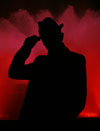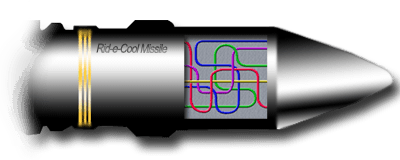Spy Dictionary - Talk like a Real Spy!
This spy glossary will help you talk like a real spy... because spies don't just talk English, they have their own spy lingo. So if you want to be a believable spy, read up and use the terms in this spy dictionary.
BRUSH PASS
A "brush pass", also known as "brush contact" is the term used to describe a brief moment where two agents 'meet' and quickly exchange information, documents, and/or equipment.
If you would actually see this happen (but it's hard to really notice it happening), you would see two people just brushing each other as they're passing. It's very casual.
As they "brush", information is exchanged. The hand is quicker than the eye!
BUG
A "bug" is a secret listening device that is used to listen in on conversations while not being in the same room.
It can be a tiny battery-powered microphone and transmitter (more easily detected, as it sends out a signal) or a recording device (often bigger, but since it doesn't send out a signal so not so easily discovered. But you have to retrieve it later).
A bug is often placed inside a telephone, with the specific purpose of listening in on phone conversations.
BURNED
When a spy is "burned", it means that he or she has been discovered. For example, when you are tailing someone, and this person notices that you are tracking their moves, then you've been burned. Even worse, when you're exposed as a spy, you're also burned.
Sometimes the word "toast" (as in "I'm toast!") is used to communicate that you've been discovered.
The word "burn" is also used in combination with other words, like "burn bag". This is a bag that holds important information that should be destroyed immediately on discovery. That these items are kept together makes it easy to dispose of them quickly.
COVER
The cover of an agent is the role that an agent plays to hide that he's actually a spy. So, when you are "under cover", you pretend to be someone else, or you act as if you have a different job than being a spy.
To make sure that your "cover" isn't "blown" (ie. you are discovered to be a spy), the cover should help you explain why you are where you are, and you do what you do.
For example, if you must be in the school hall for an investigation during class, your cover may be that you are sick and going to the school nurse. So, if you run into a teacher, you can explain why you're there (not the REAL reason of course!). To make your cover believable, act as if you're sick when roaming the school hall.
So you don't always have to pretend to be someone else.
DEAD DROP
The "dead drop", also known as "dead letter box", is a special location that is used to get information (or objects) from one spy to another spy, without the need for the spies to meet.
Anything can be a dead drop. For example, a cavity in a tree, or under a bench in a park. But anywhere where you can easily hide and retrieve messages, without drawing attention to yourself, will work.
On another location, known as the "signpost" a spy would leave some mark to signal the fact that a dead drop was made. When this sign (which can be just about anything both spies have agreed upon) is spotted, the 2nd spy would then go to the dead drop to collect.
ENIGMA
The "Enigma machine" or "Enigma" is a famous coding/decoding machine, used by the Germans in World War II. It was invented by German inventor Arthur Scherbius in 1925.
The Enigma machine has several settings for coding and decoding. It has 4 rotating letter wheels, that can be arranged in any combination, and set to a certain letter combination. As each letter is coded, the wheels rotate to make a new combination.
In addition, there are electricity cables, that can be plugged in (front) to alter the letter that will show up after the coding.
As each character of the message was pressed, another character would light up. This was the coded character that would be written down by a 2nd operator. That same letter could be decoded at the other end, by setting up the machine in the same way, and entering the coded message.
MICRODOT
A "microdot" is a text or an image that has been reduced in size so that it's just about 1mm in diameter, and usually circular in shape.
It is often put on other documents where you won't suspect it... like in a spot where a dot is expected. This period just behind the word "expected" could very well be a microdot (it isn't, so don't waste your time looking for it).
A micro dot is made by a micro dot camera, which exposes a document on a very fine grain film while greatly reducing its size. After the film has been developed, the white document (now 1 mm in size) will appear black on the negative.
It's then cut out and placed somewhere on a document where it won't stand out. Or inside a hollowed out coin. Or in your ear!
MOLE
Let's hope we never run into a "mole" in our own organization! But it's an operation that is often used by secret services.
A "mole" is an agent that has penetrated into an organization. If the organization that is penetrated is a secret service, then the mole is also known as a "Double Agent" (double as in double identities).
Trying to find out who is a mole, by planting fake intel with suspected moles, and checking out where it leads, is called a "mole hunt".
SAFEHOUSE
A "safehouse" is very much like a regular house or apartment that you live in. The only difference is that a safehouse is used by spies to safely hide from the enemy.
Even though every precation is taken to keep the safehouse... well... safe, you must always be prepared to leave it at a moment's notice if the location falls into enemy hands (is "compromised")
SHADOWING

"Shadowing" is spy talk for secretly following someone. The "shadow" part is about staying close to the one you follow, while not being seen. Just like a shadow, always with you, yet mostly unnoticed.
If you are shadowing with other fellow spies, than you'll alternate between you, as to not draw suspision. The spy that is currently watching the suspect is called the "eyes". The "eyes" are most likely to be discovered, or "burned".
SLEEPER
A "Sleeper" is an agent, who's living in a foreign country as a citizen. Unlike most other agents, the sleeper doesn't involve him- or herself in spying activity until he or she is activated for an operation.
Because sleepers live an unremarkable life, they are unlikely to be on the radar of rival secret services. This means that they can be more effective on operations.
The ultimate "sleepers" are those that have been hypnotized to do a specific task when they're activated through a specific line of text (or other signals they can see or hear). Of course, the chosen signal must be very unlikely in real life. You wouldn't want the sleeper to be activated by accident!
Go from Spy Dictionary to How to become a Spy
Go to Top Spy Secrets Homepage











New! Comments
Savvy spies can comment here... Just leave me a comment in the box below.